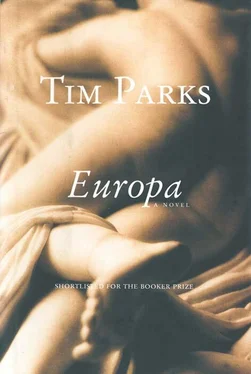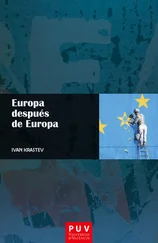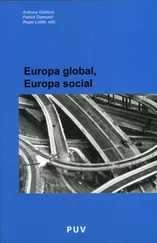Ah, yes, the ambiguity of the Euro-shag! Vikram nods his sideburns, apparently pleased to be called a Celt, while on the screen a curiously sexless Robin Williams expounds to his eager class on the theme of living one’s life to the full . I might just have to toss the old sou’wester at someone else’s door then, he laughs. And then he says her name. He might shag her , he says.
Go for it, I immediately tell him.
Y’see, what I fancy there, he says, in his interminable search for intimacy, his low voice that is never low enough (and there is a positive gale of whisky on his breath), what I fancy about that, is the razzled, last-orders look, y’know, the mauve lipstick and the skirts and stockings and shoes. The gear. Very French.
Give her hell, I tell him. My voice is flat. Quickly I say: By the way, I hope you’ve got it all organized for tomorrow? I mean, who we meet, what we say? The great campaign. Treaty of Strasbourg.
Right enough, he laughs. Then amazingly, and with that awesome remorselessness with which things can go wrong sometimes (as when, at billiards, the white shoots unerringly off three cushions into the centre pocket, doesn’t creep or slither down like the balls you’ve aimed, but slams straight home, as if nothing could be more meant, at some metaphysical level, than the unfortunate coincidence) — amazingly Vikram Griffiths announces, Oh yes, when it comes to campaigns, fuckin’ Napoleon Bonyfarts got nothing on this boyo . This boyo just rolls on from one war to the next. I’d’ve stuck the old Duke’s mercenaries right back in their Wellington boots.
And Vikram goes on then, after the brief interruption of a feminine cheer when Robin Williams invites his students to tear pages out of the books they or their parents have paid good money for, to explain the details: the Welsh MEP who will meet us and prepare us for our meeting with the Petitions Commission; then the presentation itself; then …
But I’m lost, I’m suspended between the chattering video screen and Vikram ‘s now earnest Welsh rhythms in a world where, quite apart from the subsiding ripples of pain that fanned out from the word ‘razzled’, and the vaguer, deeper disquiet generated by the fact that people don’t know about us , to the extent that this man can merrily talk about having a poke at the woman who has meant most to me in my life, apart from all that I’m suddenly riveted by the recollection of the last time Napoleon Bonaparte crossed my path, a recollection of such absurd and tangled complexity, such abject consequence, that I find it remarkable that my mind can hold it all together as a single entity, a single feeling, can say to itself, Ah, the Napoleon thing . For this anecdote, this little — no, not little, this personal — horror story, which I immediately understand I am doomed to go picking over for at least the next hour, like a ghoul over his own carrion, is the kind of improbable agglomeration of negative material that would seem to crave just one nice international word to sum it up and get it out of the way as soon as possible; the way there are convenient words like Inquisition or holocaust or pogrom which sum up whole epics of human awfulness so that they can be got out of the way with the greatest rapidity, buried forever in the immense sludge of world wide buzz^words and brand names — global warming and Gor-Tex, Coca-Cola and ethnic cleansing — or rather perhaps, assuming we have a certain level of culture , as the Italians like to say, we may exhume such words from time to time in well-written novels, serious films, to enjoy the pang, to check that it’s still there, to feel good that it is still there, as so we should, then to push them even deeper in the shit once again (in fact it’s rather unusual, now I come to think of it, that neither Black Spells Magic nor Dead Poets Society has aired the holocaust as yet, seen fit to set its compass by that convenient lodestone of human cruelty).
Oh for just one word for my Napoleonic anecdote! To be able to say, Chaeronea, the Terror, or Waterloo, and never to have to retell the story at all, never to have to think of it or through it at all. I hate having to think of things, having to go over things. The tyranny of memory But in the meantime, I suddenly tell myself, how remarkable, isn’t it, that while listening to Vikram Griffiths, now saying that it’s important the girlies are properly shown around the Parliament and hence able to feel that they have taken part , that they didn’t come allthis way for nothing, and while observing Doris Rohr, with whom I have no particular axe to grind, trying to find the space between one seat and the next to cross her thick legs in those kind of loose, too sharply creased woollen trousers (maroon) that in semiotic terms at least would surely permit her to use the men’s lavatory, how remarkable that while taking all this in, and at the same time allowing once again the complex misery triggered, absurdly, by the name Napoleon to explode in your mind, you are nevertheless still able to marvel at the extraordinariness of a brain that can do all this at once , a brain that can be totally obsessed and yet totally conscious of everything that is not obsession, locked into a tremendous, perhaps unforgivable alienation, yet aware too of a change in the hum of the coach, a change that must be the result of switching from a smooth road surface to a rough, with some of the American college boys in this pretentious and unlikely film being punished now for having left the school premises to read their Wordsworth and Whitman in the more romantic surroundings of that underground cave, perhaps grotto is the word, and Vikram doing his whisky-inspired imitation of a plummy Queen’s English to say: After which ceremony we are graciously invited to a jolly luncheon with the correspondent of the London Times . So that there is always Self, I tell myself, taking up pretty well the whole of the picture, but equally invariably there is always that little Brahminic bird sitting on one corner of the frame observing Self, observing everything around Self, and saying, To what end, to what end? And did you remember to pay the phone bill?
Or so I thought. I thought psychology had established this business once and for all, this doing and observing oneself doing, and some very long time ago too. Until I challenged her about it. Until I said: But didn’t you even feel bad doing that, wasn’t there a small part of you watching as you did it, or, in this case, said it, a small part, detached, smiling wryly, sad?
And what I meant was, Will you offer me nothing I can cling on to, no small sop of remorse, of the variety I have always been willing to give to my wife, to help her, if only for my daughter’s sake, to believe that I’m not all bad, to help her feel the past was not a farce? Our marriage was worth something?
And she said no. There were no small parts of herself that saw or did or said anything different from what the main part of her did or said or saw. Because she was a happy, together, integrated person , she insisted, in French, though I remember it in English. And just at this very moment, she went on in an inappropriately husky voice, just at this moment what she was seeing was me, what she was doing was lying there spread out naked like melted butter on fresh baguette, and what she wanted to say was, Make love to me! Why bring up that whole ridiculous story again now that we’vegot over it, now that we are back together and with nobody between us at last on one side or the other. And she said: Who cares how this came about? The fact is, it’s what we wanted!
Читать дальше












